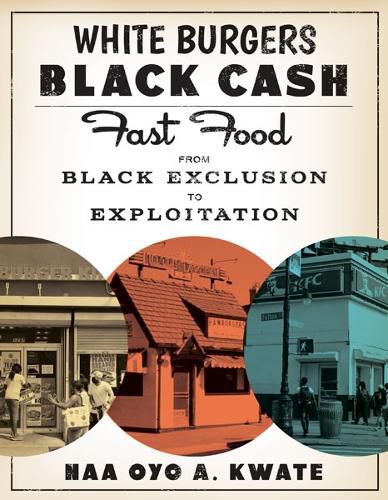Readings Newsletter
Become a Readings Member to make your shopping experience even easier.
Sign in or sign up for free!
You’re not far away from qualifying for FREE standard shipping within Australia
You’ve qualified for FREE standard shipping within Australia
The cart is loading…






The long and pernicious relationship between fast food restaurants and the African American community
James Beard Foundation: James Beard Media Award for Reference, History, and Scholarship - Winner Urban Affairs Association Best Book in Urban Affairs - Winner Association for Humanist Sociology Betty and McClung Lee Book Award - Winner Black Caucus of the American Library Association - Honor, Nonfiction category Museum of African American History Stone Book Award - Shortlist Business History Conference: Hagley Prize - Finalist Association for the Study of Food and Society: ASFS Book Award - Winner Society for the Study of Social Problems: Eduardo Bonilla-Silva Outstanding Book Award - Winner Foreword: INDIES - Silver winner, History category
Today, fast food is disproportionately located in Black neighborhoods and marketed to Black Americans through trgeted advertising. But throughout much of the twentieth century, fast food was developed specifically for White urban and suburban customers, purposefully avoiding Black spaces. In White Burgers, Black Cash, Naa Oyo A. Kwate traces the evolution in fast food from the early 1900s to the present, from its long history of racist exclusion to its current damaging embrace of urban Black communities.
Fast food has historically been tied to the country's self-image as the land of opportunity and is marketed as one of life's simple pleasures, but a more insidious history lies at the industry's core. White Burgers, Black Cash investigates the complex trajectory of restaurant locations from a decided commitment to Whiteness to the disproportionate densities that characterize Black communities today. Kwate expansively charts fast food's racial and spatial transformation and centers the cities of Chicago, New York City, and Washington, D.C., in a national examination of the biggest brands of today, including White Castle, KFC, Burger King, McDonald's, and more.
Deeply researched, compellingly told, and brimming with surprising details, White Burgers, Black Cash reveals the inequalities embedded in America's popular national food tradition.
$9.00 standard shipping within Australia
FREE standard shipping within Australia for orders over $100.00
Express & International shipping calculated at checkout
The long and pernicious relationship between fast food restaurants and the African American community
James Beard Foundation: James Beard Media Award for Reference, History, and Scholarship - Winner Urban Affairs Association Best Book in Urban Affairs - Winner Association for Humanist Sociology Betty and McClung Lee Book Award - Winner Black Caucus of the American Library Association - Honor, Nonfiction category Museum of African American History Stone Book Award - Shortlist Business History Conference: Hagley Prize - Finalist Association for the Study of Food and Society: ASFS Book Award - Winner Society for the Study of Social Problems: Eduardo Bonilla-Silva Outstanding Book Award - Winner Foreword: INDIES - Silver winner, History category
Today, fast food is disproportionately located in Black neighborhoods and marketed to Black Americans through trgeted advertising. But throughout much of the twentieth century, fast food was developed specifically for White urban and suburban customers, purposefully avoiding Black spaces. In White Burgers, Black Cash, Naa Oyo A. Kwate traces the evolution in fast food from the early 1900s to the present, from its long history of racist exclusion to its current damaging embrace of urban Black communities.
Fast food has historically been tied to the country's self-image as the land of opportunity and is marketed as one of life's simple pleasures, but a more insidious history lies at the industry's core. White Burgers, Black Cash investigates the complex trajectory of restaurant locations from a decided commitment to Whiteness to the disproportionate densities that characterize Black communities today. Kwate expansively charts fast food's racial and spatial transformation and centers the cities of Chicago, New York City, and Washington, D.C., in a national examination of the biggest brands of today, including White Castle, KFC, Burger King, McDonald's, and more.
Deeply researched, compellingly told, and brimming with surprising details, White Burgers, Black Cash reveals the inequalities embedded in America's popular national food tradition.